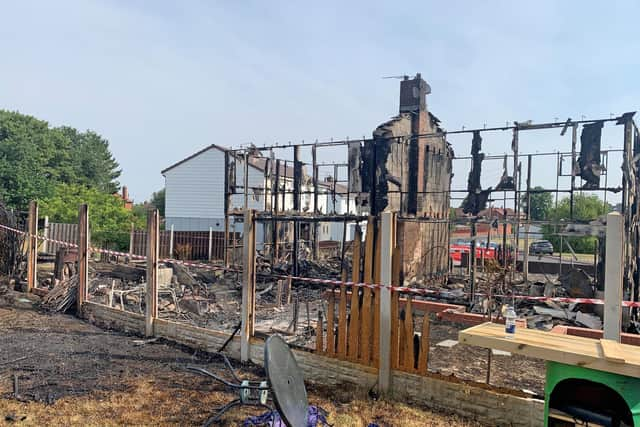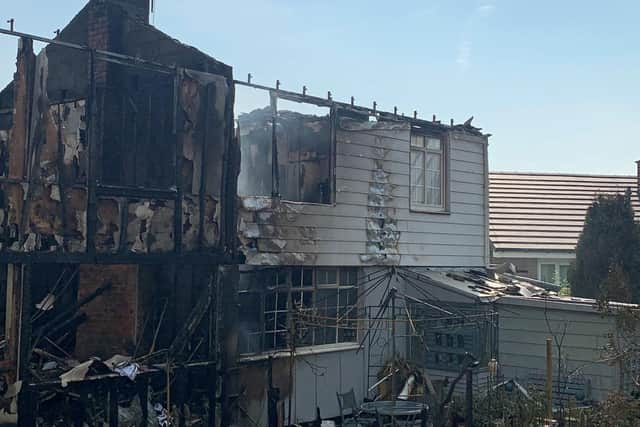At least 10 Yorkshire homes among those destroyed and damaged in heatwave-related fires
Details are still emerging about the shocking extent of the damage caused by fires on Tuesday as the country counts the cost of its hottest-ever day.
But South Yorkshire Fire & Rescue Service said yesterday they believed "at least eight" properties in their region had been destroyed, with Humberside Fire and Rescue Service confirming two houses in Hessle were affected after fires that started in gardens and spread to the properties. A commercial property in Cleethorpes was also damaged.
Advertisement
Hide AdAdvertisement
Hide AdMPs were told in Parliament yesterday of at least 60 other destroyed properties in other parts of England.


The worst incident in South Yorkshire on Tuesday was on Woodland Drive in Barnsley, where six houses were devastated when a fire broke out in a back garden and swept through nearby properties.
Residents described how they battled the flames with hosepipes for 45 minutes until fire crews arrived in a desperate attempt to stop the blaze spreading to more homes.
Jason Saville, who only returned from Tenerife on Monday, said he and his neighbours used a hose and buckets of water to beat back the flames despite pleas from police to leave the area.
Advertisement
Hide AdAdvertisement
Hide AdMr Saville said the first house was engulfed in flames within 20 minutes.


He said: “The police kept telling me to leave but I wouldn’t leave until I knew my property was safe.”
He added: “A lot of the community came together and tried to help but we couldn’t save those houses there because it was too much.”
Doncaster Council said a major blaze in Clayton on Tuesday also spread to three residential properties, and a number of houses caught fire in the Kiveton Park and Maltby areas of Rotherham.
Advertisement
Hide AdAdvertisement
Hide AdDespite the number of calls dropping from the “unprecedented” levels on Tuesday, SYFR said crews were continuing to attend incidents, with multiple calls coming in on Wednesday afternoon to report a blaze at the derelict ski village in Sheffield, which left a plume of smoke over the city.
In North Yorkshire, firefighters managed to extinguish a fire affecting a building in Sherburn which had spread from a caravan after around one acre of woodland caught alight. They also dealt with a major combine harvester fire in Thorpe Bassett which spread to 17 acres of standing crop in a 21-acre field. Another fire in Middleton Quernhow saw a barn, a workshop, a seed drill and baler alight.
West Yorkshire Fire & Rescue Service is yet to be able to confirm figures on property damage but said it had taken 2,322 calls in 24 hours and crews had to attend 275 incidents.
Dave Walton, Deputy Chief Fire Officer for West Yorkshire Fire and Rescue Service, said the situation needs to be viewed as a "wake-up call" as climate change pushes temperatures up.
Advertisement
Hide AdAdvertisement
Hide Ad“We need to learn how we get prepared as a country for this and how we rethink the resource we have, or need going forward, so we are ready for these so homes, property and ultimately people’s lives are saved.”
In Parliament, a senior minister said this week had shown the UK “must learn to live with extreme events”.
Kit Malthouse issued the warning as he updated MPs on the response to Tuesday’s heatwave, which saw record temperatures recorded across the UK, and dozens of homes destroyed in wildfires that raged in the searing heat.
The Cabinet Office minister told the Commons: “We do recognise that we are likely to experience more of these incidents and that we should not under-estimate their speed, scope and severity.
Advertisement
Hide AdAdvertisement
Hide Ad“Britain may be unaccustomed to such high temperatures but the UK, along with our European neighbours, must learn to live with extreme events such as these.
“The Government has been at the forefront of the international efforts to reach net zero, but the impacts of climate change are with us now.
“This is why we have a national adaptation programme under the leadership of the Environment Department.
“As we have seen in recent days, we will continue to face acute events driven by climate change. It is the responsibility of the Cabinet Office ministers to co-ordinate work across Government when these events take place.”
Advertisement
Hide AdAdvertisement
Hide AdMr Malthouse said at least 41 properties have been destroyed in London, 14 in Norfolk, five in Lincolnshire, "and smaller numbers elsewhere".
He noted that the new national resilience strategy will be launched “at the earliest possible opportunity by the incoming administration”.
Mr Malthouse also told MPs “by and large the system worked” during the heatwave, but acknowledged there were “some tragic deaths in water-related incidents”.
Labour deputy leader Angela Rayner said the Government is “missing while Britain burns” and warned that the Tory leadership contenders vying to be the next prime minister “will leave us vulnerable to more freak natural disasters”.